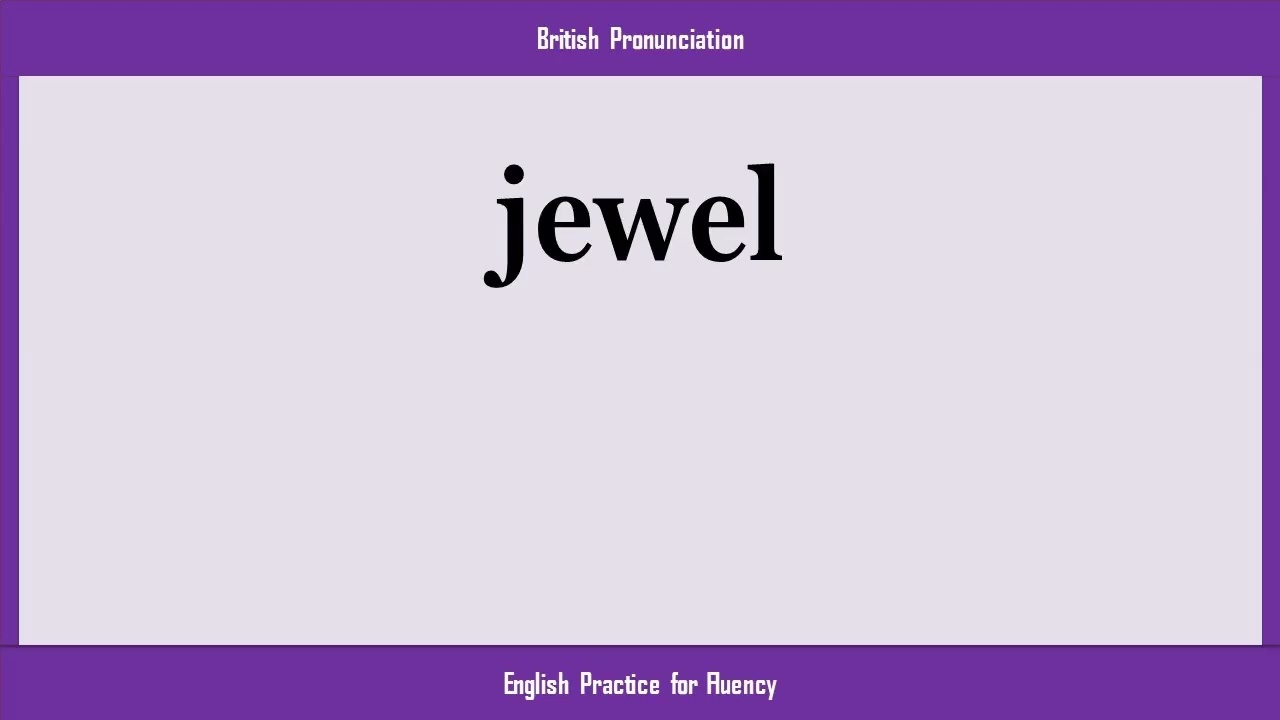Mastering the Pronunciation of "Jewel": A Guide to Eloquent Speech
Related Articles: Mastering the Pronunciation of "Jewel": A Guide to Eloquent Speech
Introduction
With great pleasure, we will explore the intriguing topic related to Mastering the Pronunciation of "Jewel": A Guide to Eloquent Speech. Let’s weave interesting information and offer fresh perspectives to the readers.
Table of Content
Mastering the Pronunciation of "Jewel": A Guide to Eloquent Speech

The word "jewel" holds a certain elegance, evoking images of precious stones and glittering adornments. But even with its captivating imagery, the pronunciation of "jewel" can sometimes pose a challenge. This article delves into the nuances of pronouncing this word correctly, providing a comprehensive guide for achieving clear and confident communication.
Understanding the Phonetic Breakdown
The pronunciation of "jewel" hinges on recognizing the individual sounds that compose the word.
- "Jew": This syllable begins with the sound represented by the letter "j" as in "jump" or "joy." It’s a voiced palatal fricative, produced by placing the tongue near the roof of the mouth and expelling air.
- "el": This syllable starts with the sound represented by the letter "l" as in "lake" or "light." It’s a voiced alveolar lateral approximant, produced by placing the tongue against the alveolar ridge and letting air escape from the sides.
Key Pronunciation Points
-
The "j" Sound: It’s crucial to avoid pronouncing the "j" as in "gem" or "gentle." The sound in "jewel" is distinct, requiring a slight raising of the tongue towards the palate.
-
The "el" Sound: The "el" sound should be clear and distinct, without any blending or slurring. Avoid pronouncing it as "ul" or "il."
Common Mispronunciations
-
"Jule": This is a common mispronunciation where the "j" sound is replaced with a "j" sound as in "gem." This can lead to a softer, less distinct pronunciation.
-
"Jew-ul": This mispronunciation occurs when the "el" sound is pronounced as "ul," resulting in a more guttural and less refined sound.
Importance of Correct Pronunciation
Accurate pronunciation of "jewel" is essential for maintaining clarity and professionalism in communication. It demonstrates a refined vocabulary and an understanding of the nuances of the English language. Moreover, proper pronunciation adds to the overall elegance and impact of spoken words.
Tips for Mastering Pronunciation
-
Practice with Phonetic Transcription: Using phonetic transcriptions like "ˈdʒuːəl" can help visualize the individual sounds and their correct placement.
-
Listen to Native Speakers: Pay close attention to how native English speakers pronounce "jewel" in recordings or live interactions.
-
Record Yourself: Record your own pronunciation and compare it to native speakers’ recordings. This can help identify any inconsistencies or areas for improvement.
-
Use Flashcards: Create flashcards with the word "jewel" on one side and its phonetic transcription on the other. Use these cards for regular practice and reinforcement.
FAQs
Q: Is there a difference in pronunciation between "jewel" and "jewellery"?
A: While both words share the same root, "jewellery" is pronounced with an additional syllable. The "jew" sound remains the same, but the "el" sound is followed by a "ri" sound, resulting in "ˈdʒuːəlri."
Q: How does the pronunciation of "jewel" differ in other languages?
A: The pronunciation of "jewel" can vary across languages. For instance, in French, it is pronounced as "ʒyəl," with a more nasal "j" sound.
Conclusion
Mastering the pronunciation of "jewel" requires attention to detail and consistent practice. By understanding the individual sounds, avoiding common mispronunciations, and utilizing various practice techniques, individuals can confidently and eloquently incorporate this word into their vocabulary. Correct pronunciation not only enhances clarity but also adds a touch of refinement and sophistication to spoken communication.








Closure
Thus, we hope this article has provided valuable insights into Mastering the Pronunciation of "Jewel": A Guide to Eloquent Speech. We thank you for taking the time to read this article. See you in our next article!